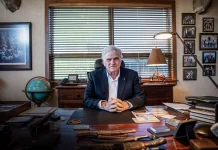WASHINGTON—The Hillary Clinton campaign learned of claims regarding Donald Trump and Russia in the summer of 2016 and sought to get media outlets to report on the information, Marc Elias testified on May 18.
Elias said he was told by Michael Sussman, a fellow lawyer with Perkins Coie—the Clinton campaign’s law firm—about the claims, prompting Elias to share the information with others in the campaign in August 2016.
Elias, the campaign’s general counsel, said the campaign wanted to see the claims reported on in the press. “I thought that if there was a news account of the allegations,” it would “benefit the campaign,” he said.
Elias was testifying in federal court in Washington during the trial of Sussman, who allegedly lied to the FBI when he said that he was not bringing the allegations against Trump on behalf on any clients. Prosecutors allege he was acting on behalf of the Clinton campaign and Rodney Joffe, a technology executive who has said he was promised a position in a Clinton administration.
Billing records presented in court by Special Counsel John Durham’s team show Sussmann billing the campaign for thousands of dollars for “confidential meetings” with Elias and others. The records were for meetings starting July 29, 2016, and going through Aug. 19, 2016.
Sussmann handed over the data, which allegedly showed a link between Trump and Russia’s Alfa Bank, to FBI lawyer James Baker on Sept. 19, 2016, just weeks before Trump beat Clinton.
FBI experts quickly concluded that the information didn’t support the allegations and the CIA later found the claims not “technically plausible.”
Elias said he did not authorize or encourage Sussmann to meet with Baker. According to Baker, Sussmann warned the bureau that the New York Times would soon report on the allegations. Elias said he didn’t think going to the FBI was a good idea because it could have caused the New York Times to delay publishing the article.
By John Haughey and Zachary Stieber














































